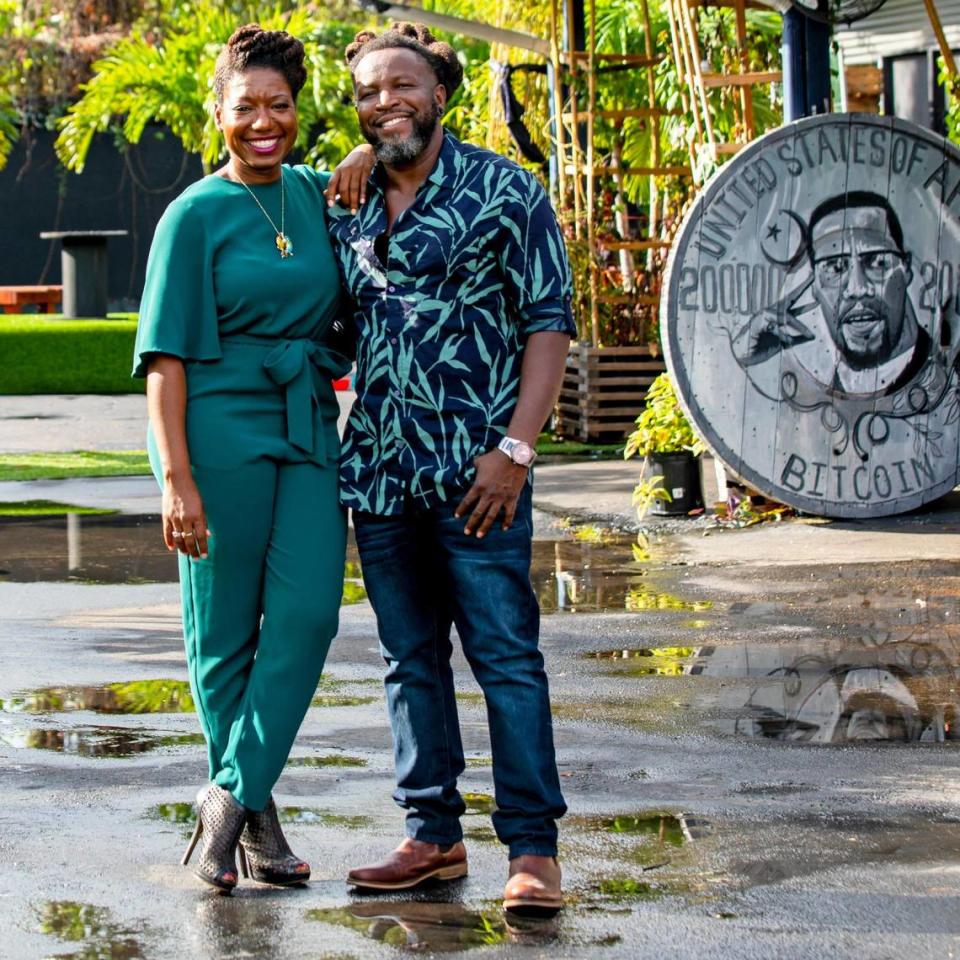MUCE’s Ashlee Thomas wants Little Haiti campus to be beacon of Black excellence
No two days are the same at the Miami Urban Contemporary Experience campus.
On a Sunday, you might find the campus packed with stalls selling everything from chicken and waffles to handmade black soap. On a Wednesday, the musings of Jidenna and Saweetie soundtrack a twerkfit class. And an exhibition showcasing Black artists might hang in the gallery.
Born out of a longing to center the Black experience, the MUCE campus, 246 NW 54th St., occupies a unique space in the Miami art world. The Magic City’s ascension to one of the premiere international art destinations has made breaking into the industry a lot more difficult. That’s especially true for artists of color, who often can’t secure gallery space and are overlooked by the museum world.
The MUCE campus provides a worthwhile alternative: a place for the community to display and access art but also feel a sense of pride, says co-founder and president Ashlee Thomas.
“All cultures build monuments to tell their stories,” Thomas, 36, explained. “.... One of our goals is to make it a space that’s monumental, that Black culture can say ‘I’m center stage’ and people can learn about the culture.”
A space for Black Miami to tell its cultural story
Located in the heart of Little Haiti, the campus opened in January 2019 following four years of Thomas’ and co-founder Bart Mervil’s work to establish the MUCE name. MUCE, as an individual entity, is an art production company that has put on festivals, exhibitions and even programming for schools since 2015. The campus was the next logical step.

“We’re here to show that we can make this happen, we can do it right here in our neighborhood,” said Mervil, 50. “So when you come here, you can see the murals of Toussaint [Louverture], you can see the murals of Malcolm X, you can see Marcus Garvey with no apologies.”
A former Range Rover repair shop, MUCE has a gallery and “the room,” a small space where creatives can debut new material alongside paintings of Charlie Parker, Ella Fitzgerald and other Black musicians. Two art bays filled with repurposed furniture provide photographers with unique backdrops. And that’s just the inside.
“Because we have an outdoor space, it’s perfect for social distancing,” Thomas said.

With a lounge area for outdoor performances and an open space courtyard, there’s room to celebrate events that commemorate Miami’s diverse communities.
The LGBTQ+ community was recently welcomed on National Coming Out Day. Women’s History Month culminated with “The Nanny Series” exhibition featuring works of Laura James and Sophie “Sona” Wong, who depicted the previously untold tales of immigrant women. The “As a Matter of Black” show highlighted the stories from the African diaspora during Black History Month.
“When you come here, I want you to feel safe no matter who you are,” Mervil said.
Artists like Alejandro “Carela” Diaz rave about MUCE and the campus. After being introduced to the space in January, he was asked to redesign an entire section. An abstract artist with a passion for creating functional art, Diaz repainted picnic tables and is wrapping up work on outdoor pillows, coffee tables and a rug.
“You have the best of both worlds — outdoor and indoor — [at the MUCE campus],” said Diaz, who described his mind as “racing” with possibility when looking at the space.
Pandemic impact
Like any business, MUCE suffered financially because of the coronavirus pandemic. Summer programs needed to be reimagined. Art exhibitions were postponed. Other events were just canceled.
But the co-founders adapted, first with the start of the open-air market and again with Thomas-taught classes that allowed the Liberty City native to flex her dancing background.
“The entire space is really activated for people to enjoy community, to enjoy some fresh air and to circulate the dollar locally,” Thomas said of the market, adding that the fitness classes were her way of getting back into shape.
As the signs of gentrification become more apparent, the MUCE campus will continue to be a fixture in Little Haiti. More than just providing outlets for Black excellence, Thomas wants to have a stake in the future of the community.
“It would be smart for us to get a seat at the table and make sure we’re represented and make sure the dollars are also funneling into our current community,” Thomas said. “And, as this community changes, [make sure] that there is a space where you can still find some semblance of Blackness.”
How to get involved
▪ Miami Urban Contemporary Experience: https://www.muce305.org/
▪ 246 NW 54th St., Miami, 786-287-7008
▪ @muce305 on Instagram and Facebook

